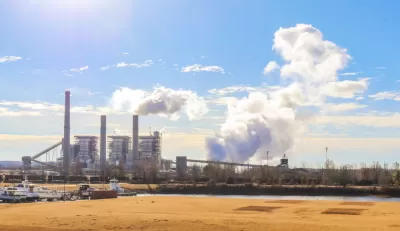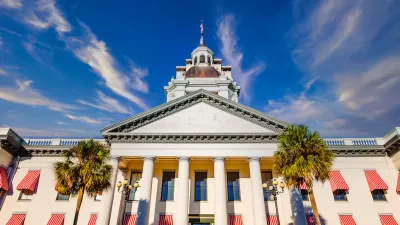The United States is making modest gains in the power and transportation sectors, but emissions in the industrial sector are holding steady, absent new reduction initiatives.

An annual report from Rhodium Group that analyzes trends in greenhouse gas emissions in the United States finds that “the US is on track to reduce emissions 24% to 35% below 2005 levels by 2030, absent any additional policy action,” far below the Paris Agreement goal of reducing GHG emissions by 50 to 52 percent. The report notes that “These estimates represent a rosier outlook for emissions reductions compared to Taking Stock 2021 (which estimated a 17-30% reduction by 2030 under current policy), but this change is largely attributable to slower macroeconomic growth projections and higher fossil fuel prices—not large policy changes.”
According to the report, “Industry becomes the largest-emitting sector absent meaningful policies to curtail emissions growth, with emissions remaining relatively flat depending on the scenario,” while the power sector continues to reduce emissions as more Americans turn to renewable energy and the transportation sector cuts some emissions thanks to electric vehicle adoption. “There has been some policy movement in the past year, although not close to the level of action required to meet the US’s 2030 climate target, and the recent Supreme Court ruling in West Virginia v. EPA has called EPA’s regulatory pathways into question.”
FULL STORY: Taking Stock 2022: US Greenhouse Gas Emissions Outlook in an Uncertain World

Alabama: Trump Terminates Settlements for Black Communities Harmed By Raw Sewage
Trump deemed the landmark civil rights agreement “illegal DEI and environmental justice policy.”

Planetizen Federal Action Tracker
A weekly monitor of how Trump’s orders and actions are impacting planners and planning in America.

The 120 Year Old Tiny Home Villages That Sheltered San Francisco’s Earthquake Refugees
More than a century ago, San Francisco mobilized to house thousands of residents displaced by the 1906 earthquake. Could their strategy offer a model for the present?

In Both Crashes and Crime, Public Transportation is Far Safer than Driving
Contrary to popular assumptions, public transportation has far lower crash and crime rates than automobile travel. For safer communities, improve and encourage transit travel.

Report: Zoning Reforms Should Complement Nashville’s Ambitious Transit Plan
Without reform, restrictive zoning codes will limit the impact of the city’s planned transit expansion and could exclude some of the residents who depend on transit the most.

Judge Orders Release of Frozen IRA, IIJA Funding
The decision is a victory for environmental groups who charged that freezing funds for critical infrastructure and disaster response programs caused “real and irreparable harm” to communities.
Urban Design for Planners 1: Software Tools
This six-course series explores essential urban design concepts using open source software and equips planners with the tools they need to participate fully in the urban design process.
Planning for Universal Design
Learn the tools for implementing Universal Design in planning regulations.
Jessamine County Fiscal Court
Caltrans
Institute for Housing and Urban Development Studies (IHS)
City of Grandview
Harvard GSD Executive Education
Toledo-Lucas County Plan Commissions
Salt Lake City
NYU Wagner Graduate School of Public Service





























